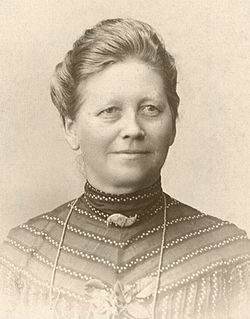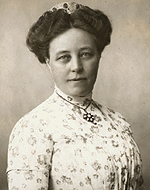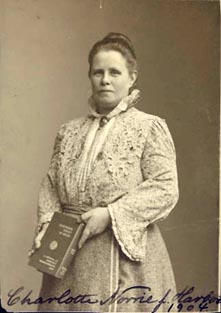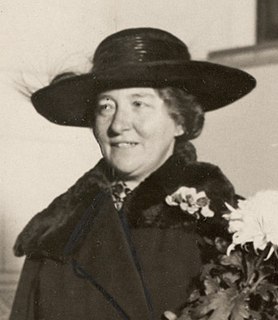Related Research Articles

The Folketing, also known as the Parliament of Denmark or the Danish Parliament in English, is the unicameral national legislature (parliament) of the Kingdom of Denmark—Denmark proper together with the Faroe Islands and Greenland. Established in 1849, until 1953 the Folketing was the lower house of a bicameral parliament, called the Rigsdag; the upper house was Landstinget. It meets in Christiansborg Palace, on the islet of Slotsholmen in central Copenhagen.

The Liberal Party is a centrist political party in Norway. It was founded in 1884 and it is the oldest political party in Norway. Ideologically positioned in the centre, it is a liberal party which has over the time enacted reforms such as parliamentarism, freedom of religion, universal suffrage and state schooling.

The Social Democratic Workers' Party was a Dutch socialist political party and a predecessor of the social democratic Labour Party.
The National Association for Women's Suffrage was a part of the general suffrage movement and the national society for women's suffrage in Sweden. It functioned as a parallel to the Sveriges allmänna rösträttsförbund which was active mainly in acquiring full suffrage for males. The LKPR was a part of the International Woman Suffrage Alliance. It was active locally from 1902 as the Föreningen för kvinnans politiska rösträtt, and nationwide as the Landsföreningen för kvinnans politiska rösträtt from 1903 until 1921.

Marie Sørine Louise Nørlund (1854–1919) was a Danish feminist and pacifist. She was the founder and chairman of the Danske Kvindeforeningers Valgretsforbund or DKV in 1898–1907 and 1908–1909.

Eline Johanne Frederikke Hansen, was a Danish feminist and peace leader.

Elna Munch née Sarauw was a Danish feminist and politician,. She was the co-founder of the Landsforbundet for Kvinders Valgret or LKV (1907), the more radical of the two main Danish suffrage movements, and alongside Johanne Rambusch its leading member.

The modern-day character and the historical status of women in Denmark has been influenced by their own involvement in women's movements and political participation in the history of Denmark. Their mark can be seen in the fields of politics, women's suffrage, and literature, among others.
Landsforbundet for Kvinders Valgret or LKV, was a Danish association for women's suffrage, active from 1907 until 1915.

Women's suffrage in Wales has historically been marginalised due to the prominence of societies and political groups in England which led the reform for women throughout the United Kingdom. Due to differing social structures and a heavily industrialised working-class society, the growth of a national movement in Wales grew but then stuttered in the late nineteenth century in comparison with that of England. Nevertheless, distinct Welsh groups and individuals rose to prominence and were vocal in the rise of suffrage in Wales and the rest of Great Britain.

Helga Charlotte Norrie, née Harbou, was a Danish nurse, women's rights activist and educator. She was a major contributor to the development of nursing as an acceptable profession for women and also campaigned for women's rights, especially voting rights.
Julie Johanne Arenholt née Rosengreen was a Danish civil engineer, women's rights activist and politician. In 1910, she became the first woman in Denmark to work as a factory engineer, inspecting the premises of bakeries in Copenhagen until she retired in 1939. She was an active member of the Danish Women's Society, serving as president from 1918 to 1921. She was also prominent at the international level, speaking at conferences and serving on the central committee of the International Alliance of Women (1923–1929).

Fanny Marie Annette Hjelmer born Raaschou (1869–1937) was a Danish women's rights activist and politician. In 1918, she became one of the first five women to be elected to the Landsting. She joined the Danish Women's Society in 1922, became a board member in 1925 and served as president from 1931 to 1936.

Mathilde Johanne Malling Hauschultz (1885–1929) was a Danish lawyer and a pioneering female politician. She was one of the first four women to be elected to the Folketing in 1918.

Marie Thora Frederikke Pedersen (1875–1954) was a Danish teacher, school inspector and women's rights proponent who was active in the Danish Union of Teachers and the Danish Women's Society. As a representative of these organizations on the parliamentary salary commission established in 1917, she was instrumental in achieving progress on civil servants' pay. Her efforts led to the Pay Act (Lønningsloven) of 1919 which introduced equal pay for men and women. She also succeeded in introducing improvements for Danish schools based on her international experience in education.

Johanne Marie Abrahammine Meyer née Petersen (1838–1915) was a Danish suffragist, pacifist and journal editor. A pioneering member of various women's societies, from 1889 she served on the board of the pacifist organization Dansk Fredsforening and became the influential president of the progressive suffragist organization Kvindelig Fremskridtsforening (KF). From 1888, Meyer was editor of KF's journal Hvad vi vil, to which she contributed many articles.

The Danske Kvindeforeningers Valgsretsudvalg was established in 1898 by Louise Nørlund, with support from Line Luplau, in order to work towards obtaining the vote for women. In 1904, the organization's name was changed to Danske Kvindeforeningers Valgretsforbund (DKV) or the Danish Women's Society's Suffrage Union.
The Kvindelig Fremskridtsforening (KF), or Women's Progress Association, was a Danish women's association which was founded in 1885 by Matilde Bajer and Elisabeth Ouchterlony. They had both been co-founders of the Danish Women's Society in 1871 but now wanted an organization which included specific attention to women's suffrage in municipal and national elections, an issue which was not on the agenda of the apolitical Women's Society. The organization also addressed women's involvement as peace activists and as members of the workforce.

Ane Marie Johansen Egeberg (1865–1952) was a Danish schoolteacher and women's rights activist. Based in Vejle, she established the local branch of the Danish Women's Society which she headed for 16 years. On the political front, from 1924 she was a member of the municipal council representing the liberal party Venstre.